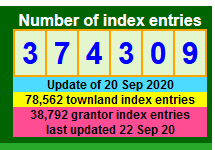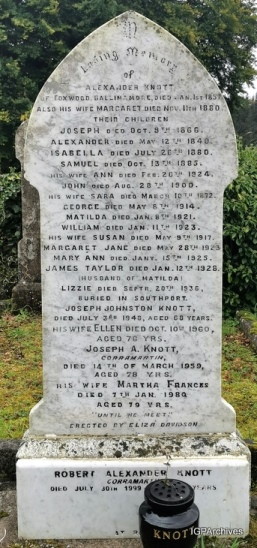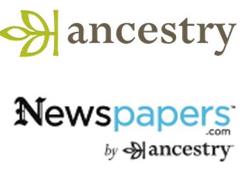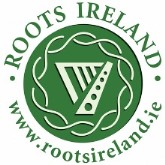It's been six months since I posted an Events Listing, so it's great to be back with a busy schedule of events in the second half of September, and even better that most of the sessions can be enjoyed by researchers no matter where they live.
Nearly all those noted below are online, and nearly are free. Some require booking, some don't.
Culture Night and the Dublin Festival of History contribute a good number of this month's events and I've not listed all of them below. I've just picked out a few random ones that sparked my interest so be sure to follow the links and explore the full programme.
Tuesday 15 September
The Birth of the Border, with Cormac Moore. Hosted on Zoom by Foxrock Local History Club. 8pm. Click here to join meeting five minutes before scheduled time.
Michael Collins: The Man and the Revolution, with Anne Dolan and William Murphy in online conversation with Mark Duncan. Michael Collins knew the power of his persona, and capitalised on what people wanted to believe. Was he the man of his age, or was he just luckier, more brazen, more written about and more photographed than the rest? Free but need to booking. 7pm.
Wednesday 16 September
Living Through Turmoil: the Ordinary and Everyday Experience of the Irish War of Independence, a lecture with Richard McElligott. Host: National Library of Ireland. Platform: Facebook. 7pm. Details.
Thursday 17 September
Cavan Women in the Campaign of Independence, with Dr Sinéad McCoole. First of the Centenary Lecture Series with Cavan Library Service. 7:30pm. Can be viewed on the Library's website or facebook page.
Friday 18 September to Sunday 20 September
Back To Our Past Virtual. More than 35 talks, mostly on traditional genealogy (three on genetic genealogy). They include researching emigrant Irish ancestors to Australia and the USA, Scottish records, Irish surnames, crime and punishment records, six short talks aimed at beginners from members Accredited Genealogists Ireland, Ireland's sporting heritage, social and local history, DNA, and much more. €10 ticket will allow access to all the talks for three months. Details.
Friday 18 September – Culture Night
Revealing the Past: Grave Rubbing Experience, online with Angelina Foster. Recording of workshop held in Old St Michael’s Medieval Graveyard, demonstrating safe techniques in taking a print from a headstone or carving. Includes discussion of symbolism of the carvings and the many stories uncovered. 5pm–7pm. Details.
Virtual Tour of Leinster House Visitors can read about the history of the building, learn about the work of the Irish legislature and explore some of the art on display throughout the chambers of Dáil and Seanad Éireann. 4pm - 11pm. Details.
Tour of the Jackie Clarke Museum, plus other entertainment on the night. The Jackie Clarke collection is one of the most important private collection of Irish history material in public hands, comprising over 100,000 items spanning 400 years. It includes artefacts associated with Theobald Wolfe Tone, plus letters from Michael Collins, Douglas Hyde, Michael Davitt and O’Donovan Rossa. It also contains rare books, proclamations, posters, political cartoons, pamphlets, handbills, works by Sir John Lavery, maps, hunger strike material and personal items from Leaders of the 1916 Rising. 6pm-8pm. Not online. Address: Pearse Street, Ballina, Co Mayo. Details. Phone: 096 73508.
Highlights from the Royal College of Physicians of Ireland. Online video, specially made for Culture Night, sees members and fellows of the college introduce the building and some of their favourite items from the collections. 4pm-11pm. Details.
Tour of Seymour's Mausoleum in Lawrencetown, an online tour of the newly refurbished Seymour’s Mausoleum, a family memorial and local landmark commissioned by the Seymour family of Ballymore Castle in Lawrencetown, Co Down. Live broadcast on Facebook. 6pm - 8pm. Details.
Monday 21 September
Suffering the Most - The Life and Times of Tomás Mac Curtáin and Terence MacSwiney, exhibition launch (delayed by the Covid-19 lockdown for 6 months). Tells the story of two of the most important men in modern Irish history. Officially opened 11 September by an Taoiseach Micheal Martin. Address: Cork Public Museum, Fitzgerald Park, Mardyke, Cork City. Covid-19 restrictions will be in place to ensure a safe and enjoyable visit for all. Details.
The National Library of Ireland’s Web Archive: preserving Ireland's online life for tomorrow, with Maria Ryan. In 2011 the National Library of Ireland began selectively archiving and preserving the Irish web. Since then over two thousand websites have been archived and many of these sites which are now saved in the NLI Web Archive no longer exist on the live web. Web archiving allows us to preserve the online life of Ireland and make it accessible to researchers both now and in the future. This talk will examine what web archiving is and how the NLI preserves themes and events such as arts, literature, elections, referendums and Covid-19. The talk is free but booking is essential as places are limited. Details.
Thursday 24 September
From Turmoil to Truce: Photographs of the War of Independence, a Zoom tour of the National Library of Ireland's exhibition. Learn about the War of Independence through the photographs of W.D. Hogan from the NLI’s photograph collection using the RTE online version of the exhibition. 11am. Free but need to book. Details.
The September 1920 attack on Arva RIC Barracks and its consequences, with Dr Brian Hughes. Part of the Centenary Lecture Series with Cavan Library Service. 7:30pm. Can be viewed on the Library's website or facebook page.
PRONI and the Creation of Ireland’s Virtual Record Treasury, a virtual research showcase of talks on key PRONI collections, explaining how they are being linked to collections from around the world, in order to replace the destroyed archive, and a demonstration of the new virtual reading room. The event includes a live broadcast of staff presenting some of the jewels of the archive. The day concludes with a History Ireland Hedge School at 7pm, as a panel of historians and archivists respond to Winston's Churchill's 1922 quote, that 'a State without archives is better than archives without a State’. Free but need to book.Details.
Poverty, Chastity and (Dis)Obedience: irish missionaries and the anti-apartheid Movement, the global premier of a 60-minute documentary dedicated to the generations of Irish missionary men and women wo devoted their lives to South Africa, standing in solidarity with its people and their struggle. Hosts,EPIC The Irish Emigration Museum & Lilliesleaf Farm. Broadcast at 6:30pm. Details.
Saturday 26 September
The Family History Show London, online. The show features an online lecture theatre, an 'Ask the Experts' area where you can put questions forward to specialists, as well as a number of virtual stalls where you can buy genealogical products. Scheduled presentations cover a variety of British family history topics from multiple speakers and will be available throughout the day. Each talk will be available for 24 hours, so don't worry if you're in another time zone. Tickets £6. Early bookers will receive a free virtual goody bag on the day worth over £10. Details.
Sunday 27 September
Quarry Road, Cabra – A walking tour with Eamon Delaney. A Dublin Festival of History event. Quarry road was built by the British Government for veterans of World War One. It is one of many such housing developments built around the city, for ex-military families, mostly from working class backgrounds. Details.
Tuesday 29 September
Queer Treasure, with Tonie Walsh. A Dublin Festival of History event. An overview of the Irish Queer Archive, its foundation and the historic transfer in 2008 to the National Library of Ireland of the IQA Collections and examines how Ireland’s national cultural institutions have embraced LGBTQ+ histories. 7:00pm. Details.
 These regular listings of additional sources are designed primarily to help family historians whose Irish ancestors emigrated to Canada, but you don't have to have heritage from Ireland!
These regular listings of additional sources are designed primarily to help family historians whose Irish ancestors emigrated to Canada, but you don't have to have heritage from Ireland!





















